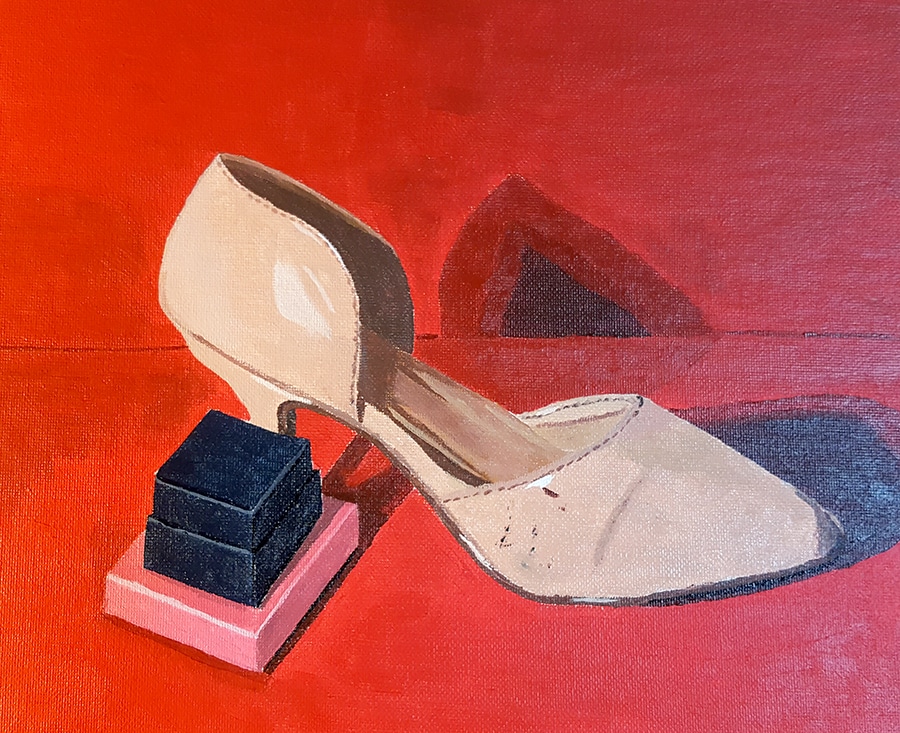Online Painting Course
4700: Painting I
Master a traditional approach to painting
For centuries, artists have used paint to represent the physical world. Now you too can learn how to paint online. In this online painting course, you'll learn a traditional approach to oil painting or acrylic painting. Working with a professional artist, you'll study a time-honored approach to painting that enables you to capture proportion, perspective, and lighting in the world around you. You'll learn how to build a foundation with preparatory sketches and underpainting, find out how to mix your paints correctly, and gain control over value through monochromatic painting and color studies.
About This Course
Project-Based Learning
Learn to paint with oils or acrylics using traditional techniques, with projects including preliminary drawing, underpainting, monochromatic and full-color still lifes, and a final project.
What Skills Will I Develop?
Students in this course can expect to learn to:
- Learn a step by step method for oil or acrylic painting that will provide a foundation for all your future work.
- Use basic drawing skills as effective preparation for painting compositions.
- Create preparatory pencil sketches demonstrating perspective, shading, and contour.
- Select quality paints, brushes, and painting surfaces, and handle them safely.
- Load a palette, mix paint colors, and hold a brush effectively.
- Prepare a canvas and create an underpainting as a painting guide.
- Evaluate value levels in a subject and accurately translate them on monochromatic and color paintings.
- Experiment with light sources to create various effects and tones on a subject.
- Demonstrate how to brighten, darken, and adjust the saturation of a paint color.
- Employ color wheel relationships to create intensity, warmth and coolness, push and pull, and other paint effects.
- Apply traditional painting techniques to create realistic and abstract effects.
- Create paintings using the alla prima technique.
- Choose and compose painting subjects to maximize contrast and visual interest.
What Software and Supplies Do I Need?
- Computer with Internet connection.
- Oil or acrylic paints, canvas, brushes, and other art supplies (full list provided in the course).
- Basic experience in drawing.
- A digital camera to submit your artwork.
Course Instructor(s)
The course is taught by the following instructor(s):
 Jordon Schranz
Jordon Schranz
Jordon Schranz is an audio/visual artist and designer whose work has been exhibited internationally in New York, Chicago, El Paso, Berlin, Bogotá, and Ciudad Juárez.
Course Outline
Preliminary Drawing
Every painting starts with a number of preliminary drawings. This lecture focuses on the fundamentals of drawing as they relate to painting. You'll look at methods for accurately representing objects in your sketches by using perspective for interest and depth, and applying believable shadows and highlights. Get your sketchbook and some household items ready for the first exercise, where you'll prepare a still life arrangement and explore your subject by drawing it from different perspectives.
Materials, Workspace, and Canvas
The range of paints, brushes, and surfaces that can be used by painters is almost infinite. This week, you'll learn to sort through the options and choose the materials that are best for your needs. Solvents, canvas types, and equipment are explored, along with techniques for safely handling them. Then you'll learn to load up your palette and mix colors.
Light and Value
Value doesn't just mean how much your art is worth in the marketplace—it refers to the amount of light that is present in your subject. Painting is all about representing light values with color, and accuracy is key. This week, you'll learn about the techniques artists use to represent light and dark with paint and how to capture depth through your color choices.
Combining Color in Paint
In this week, you will take your study of light to the next level, exploring the color wheel, color harmonies, and color contrast. You'll learn how colors relate to one another, and how to use these relationships to create interesting effects.
Painting Techniques
Using color and value, you're on the right track to bringing your paintings to life, but you need another major component: technique. Painters use a wide range of practical and stylistic techniques to develop their signature works. You'll learn about some popular historical approaches and styles in this session and explore a start-to-finish process for creating a painting.
Making a Painting
In the final lecture, you'll wrap up the course with a look at the creative side of painting: How to communicate your ideas in paint. Three painting case studies are explored, teaching you about visual metaphors and how to create intriguing compositions as you explore the beauty in everyday objects. You'll also learn techniques for painting in natural and artificial light.
Frequently Asked Questions (FAQ)
How Do The Courses Work?
Our Professional Certificate courses are project-based and instructor-led. In each course you’ll complete a series of lectures and projects designed to stretch your creative skills. The courses are delivered on a flexible schedule with no set-logins or Zoom meetings. You can study when you want, provided you complete your program by the assigned deadline.
Who Are The Instructors?
Our courses are developed and taught by our industry-leading faculty of creative professionals. This means that you’ll learn in-demand skills, get feedback on your work, and build a portfolio of creative work. View our Student Gallery for featured student projects.
When Can I Start?
You can enroll in this course on an individual basis or as part of a Professional Certificate program. Professional Certificate programs start every month on the first of the month. With rolling admissions, you can start as soon as you complete Orientation.
Explore Professional Certificate Programs: Graphic Design | Web Design | Multimedia | Digital Arts | Marketing Design | Fine Arts
How Do I Register?
To register for a Professional Certificate program, complete our program application. To register for this course on an individual basis, please contact our admissions team at admissions@sessions.edu. An Admissions Advisor will contact you to setup your enrollment.
| Course Tuition and Fees | |
|---|---|
| Tuition | $949 |
| Registration Fee* | $50 |
| Total Course Price | $999 |
Registration fees are nonrefundable after 5 days from enrollment.
Is Sessions College Accredited?
Yes. Since 2001, Sessions College has been accredited by the Distance Education Accrediting Commission (DEAC). The Distance Education Accrediting Commission is listed by the U.S. Department of Education as a recognized accrediting agency and is recognized by the Council for Higher Education Accreditation (CHEA).






















